Sarve Bhavantu Sukhinah सर्वे भवन्तु सुखिनः is one of the most popular mantras which implies the well-being of the entire universe.
This indicates and promotes peace and prosperity to the entire humanity.

This popular mantra points towards everyone’s peace and happiness. The English translation is not doing justice to this beautiful peaceful mantra, because this one indicates peace for not just ‘everyone’.
We are praying for the welfare of the entire Universe, with no exception for “us” or another.
Sarve Bhavantu Sukhinah meaning
Sarve Bhavantu Sukhinah is the prayer or mantra in Sanskrit and is widely used in the Hindu religion. Before going to the meaning, let’s look at the English translation.

ENGLISH TRANSLATION:
1: Om, May All be Happy,
2: May All be Free from Illness.
3: May All See what is Auspicious,
4: May no one Suffer.
5: Om Peace, Peace, Peace.
It’s the universal prayer and is commonly known as the peace mantra. This Sarve Bhavantu Sukhinah is the “Jivan Mantra” that makes you kind and compassionate.
Chanting this peaceful mantra will lead you to a peaceful and joyful mind and heart.
All the priests in this world chant this mantra to maintain the calmness of their minds. As well as the priests feel peace after this mantra, so you will also.
As we look at the translation, it starts with wishing everyone happiness. This “Om, Sarve Bhavantu Sukhinah” means “May all be happy”.
This greatly signifies everyone, every animal, every person, and every atom, energy, or quanta that exists should be happy and free from suffering.

Then, the second verse prays that everyone remains free from illness, meaning wishing everyone the “good well-being”, and they don’t suffer from diseases or any type of illnesses.
If you chant this mantra, you are praying that everyone gets prosperity only. They get what is auspicious and will bring goodness into their lives. This then prays about eliminating the sufferings of people.
This wishes that it only brings goodness and well-being, and keeps the people away from suffering. Lastly, it focuses on peace only.
This mantra focus on peace and wellness. And, when you pray this for everyone else, you will also get the same. Because, when you wish for ‘everyone, you are wishing for yourself as well.
We feel a separation from the outer world in some way.
We are definitely not sure what separates us, but we just know we are separate, and this feeling of separation makes us feel that we need to look for ourselves.

We need to protect and shield ourselves, and we suffer. And, this mantra brings peace to us and removes all our worries of suffering.
This mantra lets us pray for ourselves, and we begin to heal and become well.
Just knowing that we are no different from the universe, we pray that we heal just like the remaining universe.
As we all know that we humans are loaded with empathy, what we see has a direct impact on our lives in one way or another.
If we see a child cry, we will be affected by it in some way, and if we see happiness around us, it will give us joy, be it for some time.
So, if you will see people struggling and in hardships and sufferings, you will feel it similarly.
Our hearts have evolved with this empathy and reflect our emotions from the world we see around us.
The mirror reflects everything, and if you want to experience the joy in your life, there must be joy in the world all around.
Selfishly, we wish happiness, health, auspicious signs, and good fortune all around, because that’s what we wish for ourselves.
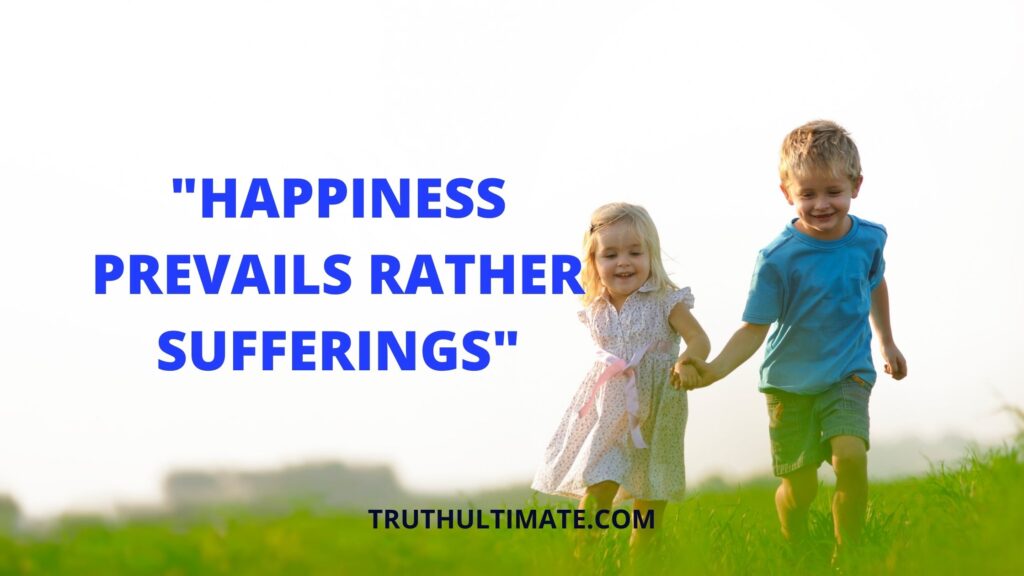
Now, let’s look and focus on the “Sukha”, which literally means ‘good space’.
Sukha means the wheel is in alignment, and this alignment means things will move smoothly and will be exactly the way it is supposed to be.
We feel a sense of order, oneness, and comfort in knowing and feeling that all is well with the world.
Because, when the outer world will be out of alignment, automatically our lives will be out of balance.
And, this is what we know as “stress”. Along with being unhappy, we are also unhealthy, unstable, and unable to meet our full potential, and this is dukkha, that we are sure none of us want in our lives.
We pray for this alignment in the first line positively chanting “sukha” as the negation of “dukkha” in the last line.
Pray goodness, wellness, and joy for everyone, and it will automatically bless your lives, bringing goodness.
Sarve Bhavantu Sukhinah Sarve Santu Niraamayaah
Sarve means, everything or ‘whole’ literally, while Sukhinah means happy or joy and niraamyaah means, healthy or disease-free.
This whole concluding it to a peaceful prayer that indicates happiness and wellness.

These two verses are a part of a peaceful mantra and are themselves a prayer.
If anyone chants this prayer, they are wishing everyone, a healthy and happy life, eliminating all the sufferings from their lives.
Because, as we established earlier, if we see a life where people are suffering from diseases all over the world or just around us, it can never bring peace to us, and will impact our life with the sadness taking place all over.
As we take the example of this COVID’19 pandemic, which is taking the lives of people and our loved ones around us, has created a sense of suffering among the masses.
We are scare of our own well-being and it has turned our lives over. We can never be happy listening to the news of people dying and struggling to cope with their illnesses.
If we look deeply at these two verses, we will automatically establish a relationship of the two together.
Happiness is connected with well-being and healthy lives. If we are unhealthy, we are unhappy.

There is no other way around, and our empathetic minds and heart also don’t allow us to be happy.
If we feel for others, we will feel their sufferings and will bring sadness and displeasure to our hearts, so it’s very important that we look for each other and pray for each other.
Pray exactly the same for others, what you want for yourself. And, healthy and happy life is the need of everyone.
So, let’s just pray for everyone, and for ourselves as well. May God bring peace, happiness, and health to everyone’s life.
Sarve bhavantu sukhinah source
May all be happy;
May all be free from infirmities;
May all see good;
May none partake suffering.
Undoubtedly, it is one of the most popular and beautiful mantras of all time.
There is no time when there is no need for happiness and health. It’s an all-time prayer.
Perhaps, the most beautiful illustration of joy and the whole idea of well-being is enormously quoted in the context of spirituality, dharma, universality, well-being, etc.
But what surprises us, is the untraceable and confusing verses of these beautiful verses.
The only reference that we get from various internet sources is its mention in Brihadaranyaka Upanishad (1.4.14).
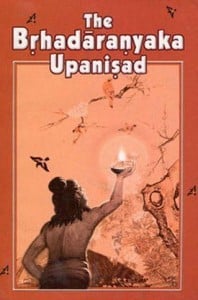
Shockingly, this is mentioned in many research papers and articles as well but, this is totally wrong, as the said Upanishad does not contain this verse in any form at all.
Then, you might think what is the exact source of this mantra? So, take a look at some of our references.
- We can find these verses, in a slightly different form in the last verse of Garuḍa Purāṇa (35.51).
- Here, the first line is slightly different from the former one, but it delivers the same meaning. Almost, it’s the same meaning. Here are the verses.
sarveṣāṁ maṅgalaṁ bhūyāt sarve santu nirāmayāḥ|
sarve bhadrāṇi paśyantu mā kaścidduḥkhabhāg bhavet||
- One Hari Parshad Das refers to āśīrvacanam of a text called itihāsa samuccaya, but the first verse is slightly different here as well. Also, the meaning remains the same. Have a look at the verses.
sarve kuśalinaḥ santu sarve santu nirāmyāḥ|
sarve bhadrāṇi paśyantu mā kaścidduḥkhabhāg bhavet||
- Comment by Prof. Ashok Aklujkar BVP Google Group discussion mentioned above mentions a note in the book of Lakshman Swarup where there is given the text of a colophon of Uvaṭa’s Mantrabhāṣya of Vājasaneya Saṁhitā.
- Here, the last verses are in variation, but still, it doesn’t affect the meaning. Here is the text:
śubhaṁ bhavatu pāṭhakalekhakayoḥ|
śivamastu sarvajagataḥ|
sarve bhavantu sukhinaḥ sarve santu nirāmayāḥ|
sarve bhadrāṇi paśyantu mā kaścitkaṣṭamāpnuyāt||
Uvata belongs to the second half of the eleventh century CE, as per the description given in the whole colophon.
So, if we look at the above references, the mantra may refer to one of these sources:
- Garuḍa Purāṇa (35.51)
- Aśīrvacanam 2 of itihāsa samuccaya
- Mantrabhāṣya of Uvaṭa
You can check the sources yourself, and decide what to believe, but here, we can give you a summary of the variations of the mantra.
Although the second and third lines remain the same in all of the sources, we can find different wordings of the first and last lines.
FIRST LINE:
Sarve bhavantu sukhinaḥ is the most popular one. But, it can be found as,
- sarve’tra sukhinaḥ santu
- sarve kuśalinaḥ santu
- sarveṣāṁ maṅgalaṁ bhūyāt
LAST LINE:
While the variations of the last line can be:
- mā kaścidduḥkhamāpnuyāt
- mā kaścitkaṣṭamāpnuyāt
- mā kaścidduḥkhabhāg bhavet
Sarve Bhavantu Sukhina Sloka
We have had a look at the translation, and detailed meaning of the verses, so here is how you can recite it as a prayer in Sanskrit.
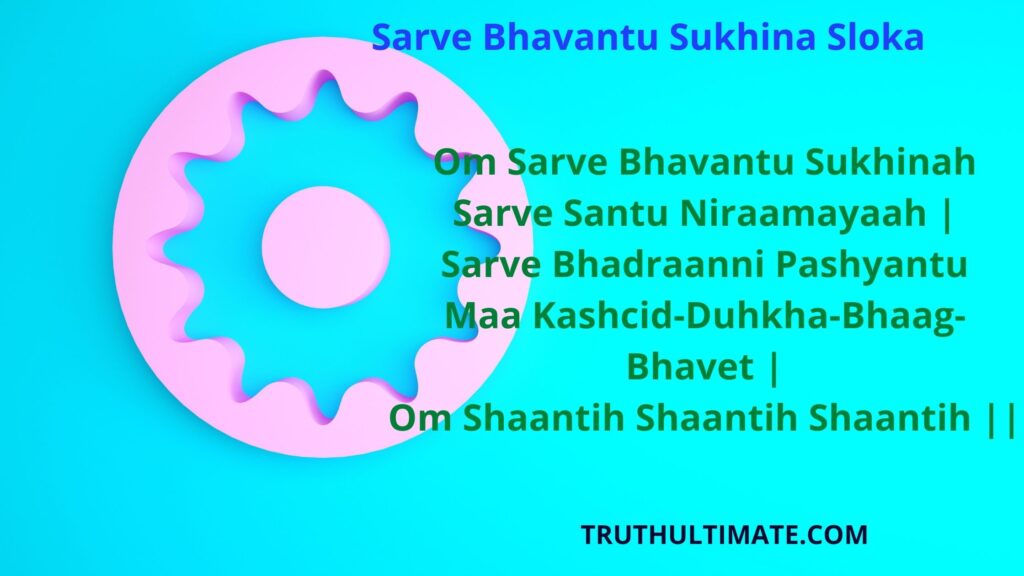
The Swasti and Shanti mantra can be your daily prayer, and may it bring calmness to your soul and mind, along with cleansing of your heart to maintain a healthy, happy, and stress-free life.
SANSKRIT:
Om Sarve Bhavantu Sukhinah
Sarve Santu Niraamayaah |
Sarve Bhadraanni Pashyantu
Maa Kashcid-Duhkha-Bhaag-Bhavet |
Om Shaantih Shaantih Shaantih ||
Sarve Bhavnatu Sukhinah prayer
This Hindu prayer is for everyone. It is now chanted for more than two thousand years and only focuses on peace, joy, and the elimination of suffering. But, why do we need “prayer”?

A Hindu leader, Swami Dayanand Saraswati explained the basis of prayers in a very beautiful manner.
His teachings on helplessness and seeking help are remarkable. He once quoted,
“The basis for any form of prayer is the acknowledgment of our helplessness and then seeking help. Prayer is born naturally when we realize the helplessness and recognize the source of all power and all knowledge. If both of these are acknowledged, prayer is very natural. If everything will be in order, there will be no need to pray. All prayers have their fulfillment in keeping everything in order. When I need help, where another person could not help me, I have to go to the source where such help is possible, and that source is the LORD who we invoke through prayers.”
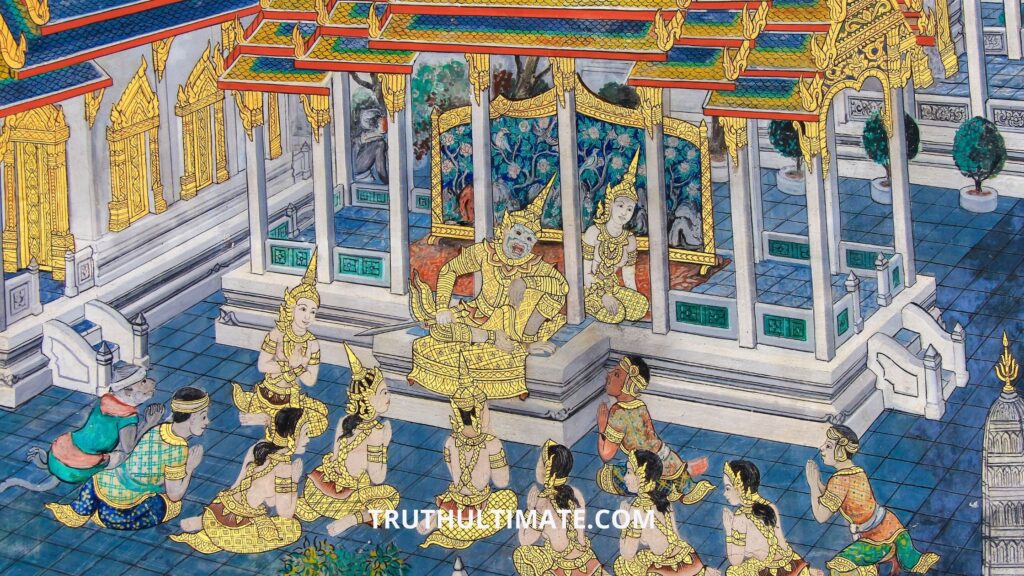
When the recitation of Ramayana ends, the verse “Sarve Bhavantu Sukhinah” is recited, wishing peace for everyone.
Let the entire world be happy, and as the Ramayana usher is auspicious for everyone, this prayer wishes the same.
Our health and joy are in GOD’s hands, so we need to pray to him for everyone’s blessing.
The prayer is not for an individual, but for all of mankind and the welfare of all is the main focus here.
Sarve Bhavantu Sukhinah Origin
We have established the source of the verses, and the origin is the same as well.
We don’t find any confirmed sources and origin, but the inspiration is from Brahadaranyaka Upanishad{ Khila division}, though the mantra is not there in this exact form as we said earlier.
This is not the exact source, but it is just an inspiration. Moreover, we hear this one at the end of most of the Hindu rituals, stories, specifically “Ramayana”.
While, you can check the sources yourself and confirm, but that doesn’t take away its beauty and effect.
It is still here to wish everyone auspiciousness and health, along with happiness.
Sarve Bhavantu Sukhinah Benefits
This beautiful prayer is the most popular as the “Shanti mantra” and is the need of the hour in these difficult pandemic times.
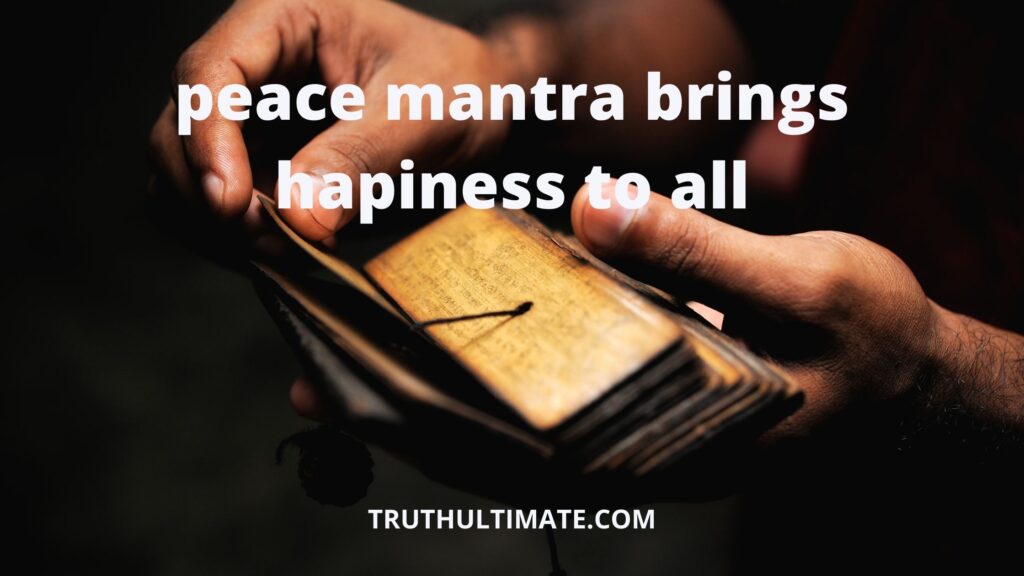
We have discussed its meaning and sources in detail, and now we have listed all the benefits of this auspicious mantra that will help you decide why you need to learn and chant this mantra every day.
- Firstly, it promotes peace and negates the idea of hate and war. As all the Hindu mantra talks about peace, this one is no different and focuses on peace for all the world and us.
- In a world, where people are more distant and have forgotten to love, this mantra tells you to believe in the idea of peace.
- Secondly, it brings people together because of its universality. This is not individual prayer, but it is for everyone.
- This mantra makes people learn the importance of thinking about the well-being and happiness of others.
- Another important aspect of this mantra is to pray for the well-being of everyone.
- It wishes everyone a disease-free life with no illnesses. Because the sufferings and the struggles of people around us are our sufferings and struggle.
- The main idea behind this mantra is to coordinate happiness with health.
- Happiness comes with health, and this mantra has beautifully interlinked both of them.

- Pray for everyone and this way you will pray for yourself. Listen and help others, and your problems will be minimized. This is what this beautiful, auspicious mantra tells us.
- Lastly, it tells you how the happiness and joy in society bring happiness to us, and how their sufferings bring sadness to us.
- It tells us our helplessness and asks us to pray about well-being, elimination of struggles, auspiciousness, and goodness for everyone.
- It’s a reminder of our universal self.
Sarve Bhavantu Sukkinah Essay
The Sarve Bhavantu Sukkinnah is a Hindu Sanskrit verse beautifully establishing a connection between health, happiness, and society.
If we want health, and happiness for us, we need a healthy society and outer world.

Because, the struggle and sufferings have a direct connection with our health, and this prayer wishes to eliminate that.
It’s a universal and complete prayer. It wishes you a balanced life with happiness, auspiciousness, and health.
In a perfect world, there will be no war, no illnesses, and no struggle of life, but then obviously we don’t need any prayers.
So, for a balanced life, life can’t be a bed of roses, and our helplessness makes us closer to God.
This verse doesn’t need any additional prayers and can easily be a part of your daily routine.
In fact, it’s best to chant it every day, as it will only bring peace and wellness to you, your family, and the outer world.
You will pray for everyone, and ultimately it will come back to you in greater form.
Hindu tradition means the entire universe is our family, so pray for them and it will impact your life with the utmost happiness and will negate the hate and sufferings in your life.
The Swasti mantra or Shanti mantra is all you need to chant every day and bring goodness to your life.
It can be a trustworthy source of strength and a great benefit to humanity.
References:
- https://yogabharati.org/article-blog/sarve-bhavantu-sukhinah
- https://greenmesg.org/stotras/vedas/om_sarve_bhavantu_sukhinah.php
- https://www.thehindu.com/society/faith/for-the-welfare-of-all/article24849381.ece
- https://hinduism.stackexchange.com/questions/14879/origin-of-sarveshaam-shanti-mantra
- https://sid-development.pl/xffkk5/sarve-bhavantu-sukhinah-benefits-a4bd2f
- https://apireinacristina.com/5fs8bep/sarve-bhavantu-sukhinah-essay-04f682





